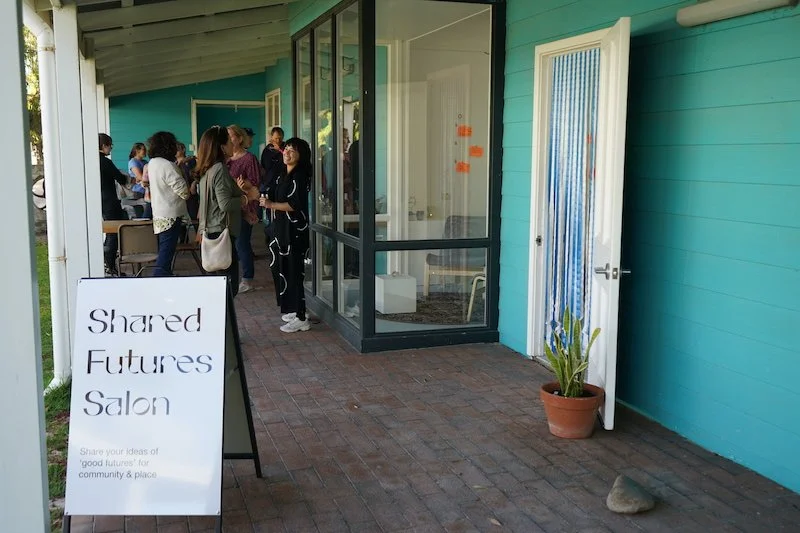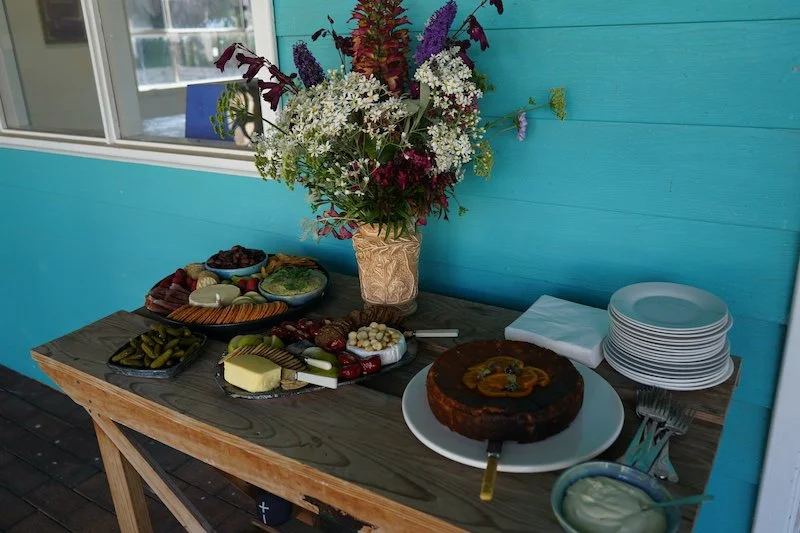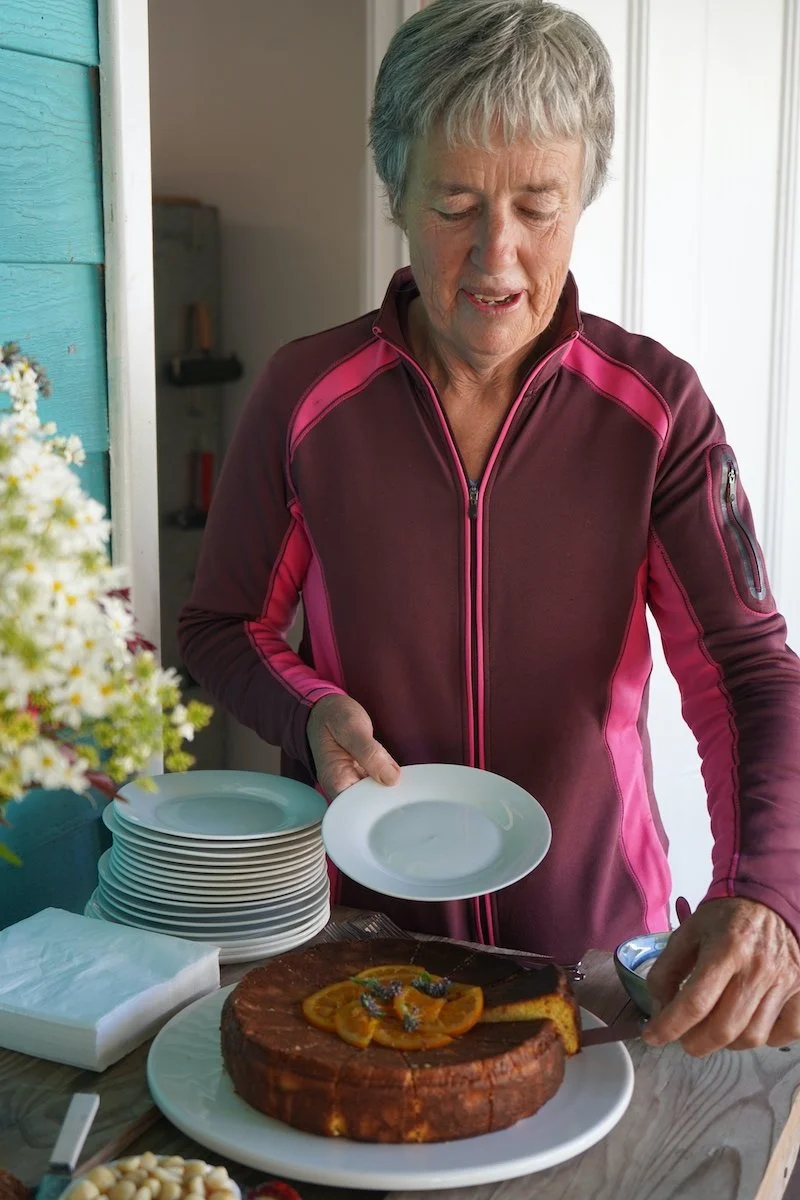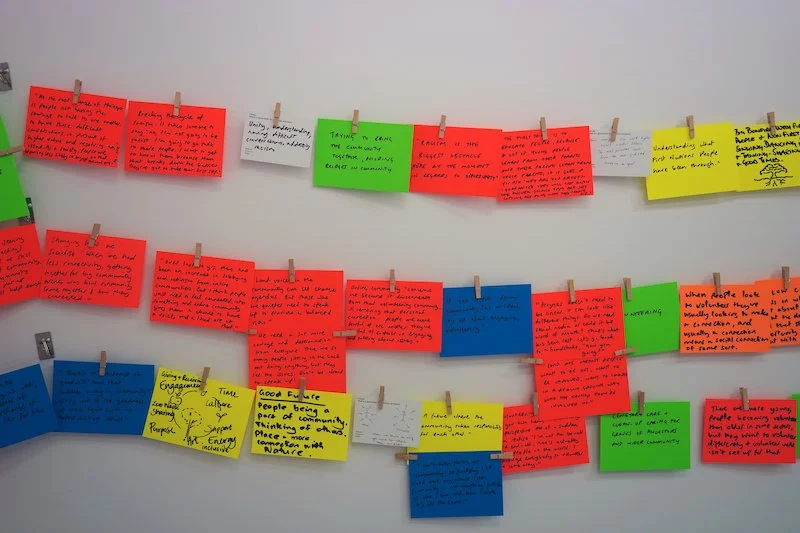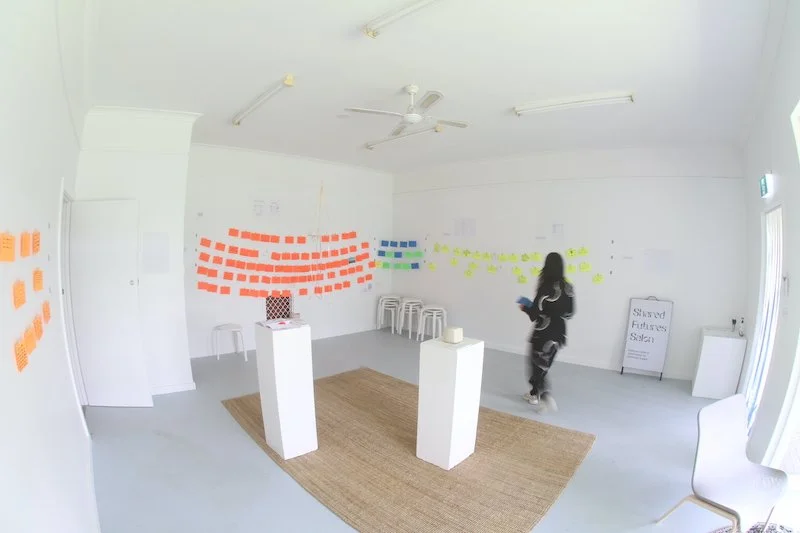Rural Utopias Residency: Ana Tiquia in Esperance #3
Ana Tiquia is currently working with the community of Esperance. This residency forms part of one of Spaced’s current programs, Rural Utopias.
Ana Tiquia is a transdisciplinary artist, cultural producer, curator, and future strategist. Integrating participatory art, design and futures practice, Ana creates public interventions: works that invite audiences into dialogue with ‘the future’. Her practice is one of inclusion that aims to ‘future’ with other humans, creatures, and things – to generate diverse, plural, and transformative future imaginaries. Ana has a deep commitment to the role of arts practice in relation to future inquiry, imagining, and social-ecological change. Her projects explore energy and material futures, futures of work and labour and the power dynamics encoded in algorithmic systems
Here, Ana shares an update:
This last fortnight in Kepa Kurl (Esperance) is all about sense-making. Stories of time, change, and futures reverberate through my mind-body, shimmer across the walls of the Shared Futures Salon, and flicker on the edge of that which moves into consciousness; an emotion, a feeling, a vibe; sometimes a thought half-realised, part manifested as it curls and winds itself into language. I'm feeling the intensity of this six-week, community-based residency: I've asked big questions of the communities I've met, and I've received equally big answers. Sitting with the complexity of what I've heard becomes a task too much for one body, and I decide a collective approach is needed.
The blank walls of the Shared Futures Salon are now a patchwork of fluorescent cards, 'good future' reflections and sketches. I write interpretive text captions for the speculative technologies created in the previous week by workshop participants, and display these as a mini-exhibition within the salon. We throw a 'sundowner' on my last Sunday in the salon, to invite and thank those who have contributed in any way to my residency and this research. As a final invitation, those who drop by are invited to view reflections on time, change, and good futures for community and place shared by others, and start the sense-making process with me by rearranging, grouping them, and highlighting themes that emerge.
Those who arrive for our celebration include those who have offered interviews, others that participated in workshops, others that have leant their time and skills. Rachel, one of the Cannery committee members, bakes a cake and brings a bounteous arrangement of flowers from her garden. I am touched again by the generosity and care circulating in this community. A quote from an interviewee displayed on the wall of the salon appears for me in this moment. “There is an 'exchange of goodwill law' that bubbles away in community” they said, describing their idea of community as “a giving of the goodness of one's heart without any expectation of return.”
During the sundowner, cards are shuffled, discussed, and moved from wall to wall. Themes, ideas, tensions begin to emerge. Perceptions of time become related to notions of change. Perceived change shapes ideas of futures, desired or less desirable. For a week after, I continue the sense-making process: grouping, rearranging, finding affinities. For this last blog post, I want to share some of the themes and tensions that emerged.
Technology: space-time-place
With the development of mobile communications technologies, Esperance has become more "connected", less isolated yet still remote. Space and time have shrunk, enabling people around the world to enjoy Esperance's beautiful beaches and environment remotely, yet instantaneously on social media. Increased connectivity opens up new possibilities for locals to connect elsewhere and holds open the possibility of remote working, while allowing Esperance to retain and capitalise upon its "rawness, remoteness and isolation" – this has become the town's "commodity."
Technology: community connection
Mobile communications technologies have changed how the community socialises, how people come together. From meeting face-to-face, communities are now connecting on our phones and via community Facebook pages. Before, big community events were where and how community came together and connected.
Technology: seeding division and enabling amplification of loud voices
But connecting online instead of in-person has its challenges, and some have seen it seed division. Online communities remove personal connection and possibly understanding. "People become more fearful of one another, and fearful of conflict and engaging and talking about issues." Online platforms can amplify already-loud voices which can set change agendas. People's need to feel connected remains and "online community gives them a chance to have a voice, and a loud one at that." Those who are quiet need to speak up (or be amplified) to provide a balanced view of an issue in community.
Technology: difficult conversations become more difficult to have
With less people engaging on a personal one-to-one, some feel people are losing "the courage to talk to one another, to have those difficult conversations in pursuit of higher value and resolving an issue." Talking with others and breaking down barriers is seen as key to addressing challenging issues such as racism. One person said that breaking the cycle of racism "takes someone saying, 'no, I'm not going to be racist, I'm going to talk to those people. I want to get to know them,' because then that breaks down the barrier."
Bringing the community together; unity between First People and settlers
Racism was described as "the elephant in the room" when talking about the community's future and "the biggest obstacle here at the moment in regards to opportunity". Fostering understanding is described as key to addressing racial divisions: both understanding the experiences of First Nations People and "what they've been through", and understanding what racism is, and how it is perpetuated. Finding an opportunity for community to come together across difference was often expressed as representing a 'good future'.
The desire for Esperance to "come together", to find a spaces for gathering across difference
One of the strongest messages heard across interviews and conversations was the strong desire for Esperance to come together as a community, whether people felt the community was unified or divided. There is "a sense that people want to be involved in things coming together," and that if Esperance came together and "were united," it could be "the best place in W.A." Many define community itself as unity and finding a "common place"; some speak to establishing a space or place where commonality can be found, across difference. To bridge divides communities have to be "more open-minded and collective." Community is central to thriving and is fostered by "anything that encourages people to come together, work together, talk together."
Community is belonging
Community was described as a sense of belonging. Belonging is described as key to individual and collective flourishing. Belonging to a place means also belonging to its people – being known and knowing that you can reach out to others when you need. Belonging to a small community can also have its challenges. While there are benefits to being more closely connected, many highlighted that they experienced judgement by others, or felt it was difficult for them to express their difference, be it across the religious, sexual or gender orientation, race, ethnicity or age intersections.
Celebrating difference
For many, a 'good future' is one where the community celebrates difference. Inclusivity was a major theme here, with many speaking of the need to celebrate across a range of differences including people of different ages, racial and ethnic backgrounds, and the LGBTQIA+ community.
Informal economies: giving, care, sharing, exchange, volunteering. Relationality: from 'me' to 'we'
Many described the many types of 'informal economies' that build and sustain community here, with one person describing goodwill as kind of community currency. Examples of informal economy activities involved giving as well as receiving, bartering of goods, zero-waste sharing, volunteering, developing ways to 'give back' to community – including wealth distribution mechanisms such as community trusts and funds. Many expressed their idea of a good future as being one where people think and do more for others, a future which shifts the focus away from the isolated 'individual,' to a future where community takes responsibility for each other, and individual wellbeing and community wellbeing is seen as interdependent. Reflecting this relational view, when asked to describe community, one person said they couldn't think of community as separate to themselves. "I've lived here my whole life. Community is not anything outside of who I am, and how I work. It's all the same." Volunteering was described as a key way individuals could see themselves as a part of a collective whole in ways that help others as well as benefit a volunteer's own wellbeing. "Volunteering takes you out of your own head, it puts things in perspective. All of a sudden you realise 'I'm not the be-all and end-all, there's actually other people in the world."
Volunteering: meaningful connection and slow care
Volunteering emerged as a major theme in terms of how people relate to ideas of time, community, purpose and meaning. One person described the very concept of 'community' as being about "engaging, volunteering." The face-to-face nature of much volunteering was seen as a panacea to a decrease in personal connection driven by online communications and social media. Many described the energy they saw in the community for people to connect meaningfully with issues they deeply care about. Volunteering is understood as providing connection, particularly a social connection. One person spoke about the concept of "slow care" and the idea of joy in volunteering as connected to a volunteer being able to take their time, to go slow and perform the work of care "off the clock." Many discussed that younger generations weren't volunteering in the same manner as older generations; young people have an energy and interest in volunteering, but volunteer organisations need to be set up to accommodate them and different generational needs.
Time, slowness, moment-to-moment meaningfulness
Many expressed that their experience of time was strongly connected to meaningful activity – both through acts of service to others, as well as through smaller, quieter moments such as being with a loved one, or connecting with their environment. Experiencing time meaningfully meant going slow, savouring a given moment, and living in moment-to-moment awareness.
Time poverty, time as commodity
Many experience time moving all too quickly, and several described themselves as being "time poor." In these contexts, time was expressed as a "precious commodity," an increasingly scarce resource. Many described feeling overwhelmed and exhausted at the speed at which they experience time and the amount of things which compete for their attention. A lack of "free time" is attributed to people working longer hours; within two parent households the pressure upon both adults to work to pay off a mortgage. This was also seen as impacting upon the "free time" of older generations, with grandparents increasingly being called upon to do childcare.
Widening economic inequity
Many discussed the success and changing fortunes of farmers over a couple of generations in this region as bringing opportunity to the community and younger generations. Increases in land prices as well as the increasing scale of farms were two factors (in combination with changing agricultural practices and knowledge), attributed to the success and affluence of broad acre farmers in this region. But some shared concern for what they feel is a "widening gap between the 'haves' and have-nots' in the community. A 'success to the successful' model was described, where farms scale up to increase efficiencies, in turn increasing their competitiveness and ability to purchase more land, which in turn enables the continual process of scaling up. This indicated at a trend towards monopolisation, where, in conjunction with rising prices of land, smaller landholders would inevitably find it more desirable to sell than keep their landholdings, and small players would be effectively 'priced out' of the market and unable to buy a farm without a significant amount of equity. Notable initiatives for farmers to 'give back' to the community provide examples of how several in the community are creating mechanisms for wealth distribution and to address wealth imbalances through the establishment of funds and trusts. While prices of property rise, many expressed concern over Esperance's housing crisis and lack of rental accommodation, impacting those who are unable to enter the property market. Some expressed concerns that an unequal income distribution "affects a community's cohesion", and others hoped that sections of the community would not feel "resentful" or "side-lined" by the direction the community is heading in. One person articulated a 'good future' involving a universal minimum wage "so people aren't in the fight or flight zone all the time."
Dynamic between less people living rurally and increased automation
Changes in rural populations and increased automation of farm labour and processes were described as interlinked. The emergence of fully automated machinery such as headers and seeders, and a next generation of 'swarm tech' to perform smaller, previously manual tasks such as weeding is anticipated in the near future. A future with few human farm workers was described: "We used to go into a paddock and do a job. Now, we have a computer software driving a machine and telling a machine what to do."
Changing Relationship to land, land management practices
Several spoke of the rapid changes to the landscape and to land management practices over the last century, from Aboriginal land management practices to widespread clearing of the land, development of new farming practices to enrich nutrient-poor soil, and the emergence of precision agriculture.
Ways of anticipating change
People spoke of different ways they register change, in the community, in place. Many spoke of 'feel' or 'gut feel', one person who articulated how they could "feel" when local leadership wasn't quite right in the community. Farmers spoke of using their senses: wetting a finger and holding it up to the wind still tells you which way the wind is blowing. Educated guesses, based on previous experience data also plays a role in anticipating yield for farmers. Collecting environmental data including soil moisture, rainfall records, biomass calculated through satellite data, and using software to analyse this are other ways farmers produce yield estimates.
Theories of Change
Many theories of change were put forward. Some spoke of the inevitability of change, and the need of change to "progress." Others attributed change to external drivers such as technology and pandemics. Many said they believed individuals and community groups made change. Some perceive change in Esperance to be "hard," or very slow – believing there to be a resistance to change in the community. Others spoke to the need to be "realistic" about change, that it doesn't happen right away but rather in small steps, and by starting conversations, and cultivating patience. One person spoke of the necessity of having passionate, yet appropriate conversations and actions while keeping an aim or goal in sight that an individual or group could work towards. Others also spoke to change occurring first from within – by being touched or stirred towards change by emotions, that change can is first felt within the body: "Nothing can change unless the human heart is first changed." A personal responsibility towards change was also voiced, with some people noting that although many look for change, not everyone wants to "do the work themselves" or "be a part of the effort." To address this, one person spoke to the necessity of empowering people and involving them in change processes. Another articulated the need to shift deep narratives, and that change is possible as "we can all change our stories."
Growth and opportunity
For many, growth is synonymous with opportunity, and opportunity with a 'good future' for themselves and the next generation. Many expressed wanting to see Esperance grow "a little, but not too much." One person identified their 'goldilocks threshold' for growth as being a population of approximately 20,000 people, in order to improve hospital services and access to health services for the community. Others saw growth as increasing the variety and diversity of those who live in the community to make life "more interesting" and a move from the city to a rural community more attractive. Growth was also attributed to growing opportunities in education and training and preventing a 'brain and skills drain' for those who have to leave to pursue education elsewhere.
While the conversations I've had with people in Esperance have been particular to personal histories and place, many wider themes could have easily emerged from conversations in other places in Australia – including metropolitan and urban communities. While concerns about housing crises, widening inequality, and relations between First Nations People and settlers are topics of concern across several rural, regional, and metropolitan communities in Australia, it was interesting to see how these wider patterns of change were reflected in the community and in conversations with community members.
As I begin to pack my bags and ready myself to leave Esperance, I reflect upon what I've learnt from the community. In the six weeks I've been here I've experienced so many different ways of 'doing' and making community. I have heard how some experience community as indivisible from 'self'; similarly, I've heard at the collective level that community is indivisible from the idea of a 'good future'. I started this residency with a curiosity to learn how people in Kepa Kurl (Esperance) were 'doing' and 'making' futures. What I've seen is the interrelated nature of 'future making' and 'community making' here. The valuing of connection, community, and the coming together of groups across difference emerged strongly across a range of conversations on 'good futures'. At the end of my first stage here I see glints, sparks, shimmers of a future emerging. Although the shape of it is still unclear, I wonder about the future we will make and share when I return for the second stage of this residency.

